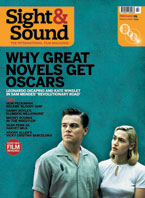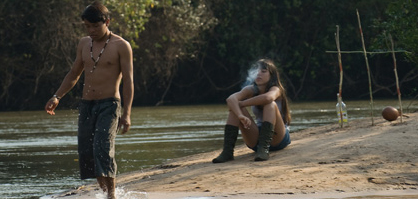Primary navigation


It's five o'clock in the morning and I'm woken with a start by the jabbering of monkeys outside my hotel room. The room suddenly feels airless, so I open the window - a mistake. I'm staying in the inland Brazilian city of Manaus, metres from the edge of the Rio Negre river - one of several that will eventually join to form the Amazon - and the air that oozes in is thick and humid even at this early hour. By midday it will be so sticky that stepping out of the air-conditioned hotel has the effect of entering a Turkish bath. Such a place may seem an unlikely setting for a film festival, and yet each year since 2004 Manaus has hosted the Amazonas festival, a week-long event whose central focus is on films with themes relating to the environment, ecology and sustainable development.
For cinephiles there is another quirky link between this city stranded in the middle of the world's largest jungle and one of the more idiosyncratic works of cinema history. Looming above the city's downtown district, with a colonial grandeur entirely absent throughout the rest of the town's concrete sprawl, is the grand Teatro Amazonas opera house, built in the 1890s in the midst of the belle époque by Portuguese colonialists grown fat on the proceeds of the rubber boom that was then gripping the world. The men behind the project had the eccentric ambition of bringing the civilising glories of opera to the natives, and so making Manaus a cultural centre. Sounds familiar? That's because Werner Herzog was inspired by its example to direct Fitzcarraldo, his 1982 film starring Klaus Kinski as an opera-loving, would-be rubber-baron who dreams of constructing an opera house in the jungle, and in order to fund his mad scheme drags a boat downriver and through jungle to stake his claim to precious rubber trees growing in an inaccessible area of the Amazon.
At the beginning of Herzog's film Kinski's character is seen visiting the Teatro Amazonas, and there was a jolt of recognition as the festival guests - a motley crew of film journalists, environment writers, Brazilian soap stars and a celeb-studded jury including the likes of Neve Campbell and Parker Posey, headed by a permanently overheated looking Alan Parker - arrived at the Teatro for the opening film of the festival.
The programme was divided between features, documentaries and locally made shorts and animations. Features were screened in the Teatro Amazonas itself, and with everyone operating on slowed-down Brazilian time, usually started at least an hour late. The top prize in the features strand was won by Iranian director Arash T. Riahi's For a Moment, Freedom, a story of Iranian political refugees' attempts to get asylum in Austria.
Closer to the festival's central theme of the environment, however, was the locally set feature Birdwatchers. Based on fact, it's about a rebellion by Amazonian Indians who are dispossessed of their land through a combination of local farming practices and government policies, and forced to live in designated reserves where job prospects are scarce, leading to despair and a high suicide rate among young men. Though directed by the Argentinian/Italian director Marco Bechis, the film feels authentically the voice of the local community, and its makers claim it to be the first feature to boast Brazilian Indian people in lead roles, as opposed to mere background parts. There was a real sense of pride and excitement as the cast and crew assembled on the stage of the Teatro Amazonas after winning the Jury Prize.
Birdwatchers was a good choice for the prize, as it showed the complexity of the challenges facing local people, from cultural misunderstandings between Indians and farmers, to the destructive deforestation that may occur even in pursuit of noble aims like planting for biofuels. The film also tackles the ironies confronting well-intentioned 'eco-tourists': the opening sequence shows a group of face-painted, semi-naked Indians standing on a river bank, weapons in hand, as a group of western birdwatchers drift by in a canoe, before a cut takes us to the same Indians later, putting their shirts and trousers back on as a tour guide pays them.
It's a telling moment of clarity that inevitably begs questions of the Amazonas festival itself. Can an event that involves flying a large number of journalists, film-makers and celebrities across the world to the heart of the Amazon jungle, putting them up in a not unluxurious hotel on the outskirts of Manaus and treating them to a series of sightseeing trips upriver, keep a straight face when describing itself as environmental? To its credit, it is an issue the festival acknowledges, and goes some way to confronting: according to the organisers, the carbon footprint of the festival is offset by the planting of 12,000 trees, and money is invested in water-treatment programmes and other schemes.
Why not hold the festival somewhere in Europe, and encourage everyone to travel by train? I put the question to Lionel Chouchan, a director at the French public relations company Le Public Systeme, who founded the festival with the cooperation of the Amazonas state. Chouchan argues that such an event would be unlikely to attract the same number of guests, and so would struggle to get the press interest that in turn draws attention to the issues raised by the films in the festival's programme. It's easy to be cynical about pampered movie stars earning favourable PR through some choice comments on the environment, but there's no denying the power of film to encourage a new and more responsible approach. As Chouchan points out: "Al Gore's An Inconvenient Truth probably did more than Kyoto to raise public awareness of global warming."
The films in this year's documentary programme proved to be a very mixed bag. A number of them would have found a more natural home on the learning-zone on BBC2 at three in the morning, but at least a few were genuinely revelatory. The best of the lot - and eventual winner of the top prize in this category - was Australian director Robert Nugent's beautifully insightful and elegiac End of the Rainbow, which records the devastating effects of the construction of a western-financed gold mine on a poor community on the Guinea-Mali border, who had traditionally survived by panning for gold. We watch with mounting anger and sadness as the local chief slowly realises that far from benefitting his village, the mine in fact destroys the delicate and long-established fabric of the community, alienating people from one another and disrupting the interdependence that has sustained them for decades. The western engineers behind the mine don't appear to realise the negative effects their project is having, but nonetheless End of a Rainbow's depiction of greedy foreigners duping African communities shows that the underhand tactics of King Leopold and Stanley in 19th-century Congo have their equivalents today. End of a Rainbow sits with Darwin's Nightmare as an indictment of the lesser-known evils of post-colonialism, and deserves a wider audience.
The winner of the audience prize in the documentary section was Canadian director Ian Connacher's Addicted to Plastic, which took a very different, less poetic approach than End of a Rainbow, but nonetheless proved an amusing, informative and sometimes shocking exposé of our reliance on plastic and the catastrophic effect our 'addiction' has had on the planet. The most eye-opening moment in Connacher's film comes as we follow him by boat to one of the most remote parts of the Pacific, only to find plastic detritus bobbing everywhere.
Away from those strands of the festival organised by Le Public Systeme and aimed primarily at foreign visitors were programmes and events organised by the Amazonas state itself. Among them was a programme of locally made shorts, none especially interesting cinematically. But their inclusion demonstrated the importance of the event for local people. The state brought the festival to Manaus' public by hosting screenings in hospitals, jails and on temporary screens at bus stations across the town. Despite my many attempts to arrange a visit, it was considered too dangerous to attend one of the screenings in the local jail, but the bus-stop screenings made for a charmingly odd sight, as slightly bemused crowds stood watching the locally made films that screened continuously amid the sweltering, bustling Manaus days and nights.